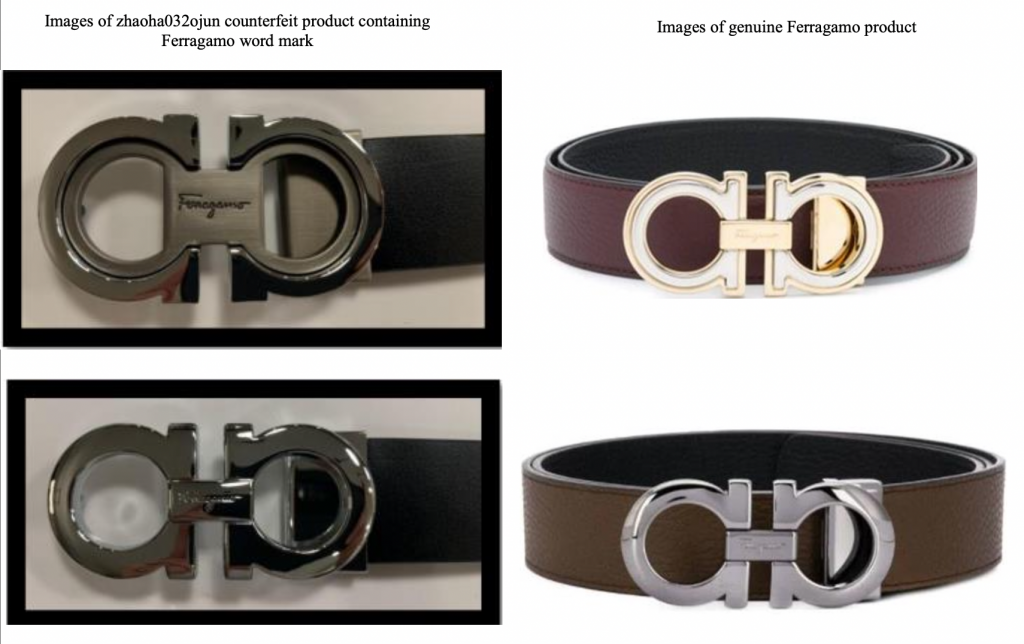Amazon has teamed up with Salvatore Ferragamo to file its latest joint trademark actions. According to two complaints that they filed on Thursday in a federal court in Washington, Amazon and Ferragamo claim that four individuals and two commercial entities – one of which is listed as CANGZHOUSHUOFENGDIANZIKEJIYOUX IANGONGSI – are on the hook for selling “counterfeit Ferragamo products” on Amazon’s third-party marketplace “using Ferragamo’s registered trademarks, without authorization, to deceive customers about the authenticity and origin of the products and the products’ affiliation with Ferragamo.”
In the newly-filed lawsuits, Amazon and Ferragamo claim that the named defendants, most of whom are based in China, engaged in a scheme that saw them create Amazon seller accounts last year “to advertise, market, sell, and distribute counterfeit Ferragamo products,” and “in an apparent effort to evade Amazon’s anti-counterfeiting detection tools,” they “omitted any mention of the Ferragamo word mark in the product descriptions,” and instead, referred to the products in a generic way, describing them as “fashion dress belts,” for instance.
Upon discovering that the defendants were offering up “what appeared to be Ferragamo-branded belts complete with Ferragamo marks and design elements,” Amazon asserts that it conducted a number of test purchases of the belts being sold by the defendants. Ferragamo then “compared the [defendants’] products to its authentic products and determined there were distinct differences in construction and details,” thereby, giving rise to counterfeit causes of action in violation of federal law, as well as the terms of Amazon’s third-party marketplace, and prompting Amazon to permanently disable their seller accounts and ultimately, take legal action.
As a result, Amazon and Ferragamo assert that the defendants “have infringed and misused Ferragamo’s intellectual property, willfully deceived and harmed Amazon, Ferragamo, and their customers, compromised the integrity of the Amazon store, and undermined the trust that customers place in Amazon and Ferragamo,” and as a result, “are subject to liability for their wrongful conduct both directly and under principles of secondary liability including, without limitation, respondeat superior, vicarious liability, and/or contributory infringement.”
The two plaintiffs further claim that the named defendants are part of “a collection of individuals … who conspired and operated in concert with each other to engage in the counterfeiting scheme” at issue, with some of the participants currently unidentified as a result of the fact that in order to avoid identification and liability for the sale of counterfeit goods, “the defendants took intentional and affirmative steps to hide their true identities and whereabouts from Amazon and Ferragamo by using fake names and contact information, and unregistered businesses to conduct their activities.”
Despite shutting down the known-sellers’ accounts, Amazon and Ferragamo – which set out claims of trademark infringement, false designation of origin, and violations of the Washington Consumer Protection Act, the latter of which prohibits unfair or deceptive business practices – are seeking a court order permanently enjoining the defendants and anyone acting in concert with them from not only engaging in future infringing conduct but “from selling [any] products in the Amazon store” whatsoever. Amazon is also seeking damages in connection with the suits even if it seems entirely unlikely that it will get them given that the defendants will almost certainly not respond to the case, assuming that they can even be alerted to the filing of the case given that, as Amazon and Ferragamo assert, they have used “fake names and contact information, and unregistered businesses to conduct their activities.”

A Trust-Building Agenda
With that the foregoing in mind, it seems clear that while the complaints (and the remedies sought in connection with them) center on Amazon and Ferragamo’s counterfeiting causes of action, they come in furtherance of Amazon’s pattern of routinely driving home its enforcement efforts in order to build up the legitimacy of its marketplace in light of repeated pushback from brands, trade organizations, and the U.S. government. After all, in addition to setting out its trademark-centric claims, the complaint does what similar cases before it have: it touts Amazon’s “Efforts to Prevent the Sale of Counterfeit Goods.”
For instance, Amazon asserts that “in 2019 alone,” it “invested over $500 million and employed more than 8,000 employees to protect its store from fraud and abuse,” stopping “over 2.5 million suspected bad actor selling accounts before they published a single listing for sale and blocked more than six billion suspected bad listings before they were published,” and thereby, ensuring that “99.9% of all products viewed by customers on Amazon did not have a valid counterfeit complaint.”
In furtherance of its aim to “build and protect the reputation of its [third-party marketplace] as a place where customers can conveniently select from a wide array of authentic goods and services at competitive prices,” Amazon says that “each week [it] monitors more than 45 million pieces of feedback it receives from customers, rights owners, regulators, and selling partners.” When it “identifies issues based on this feedback, it takes action to address them,” using “this intelligence also to improve its proactive prevention controls.”
While it “prohibits the sale of inauthentic and fraudulent products and is constantly innovating … to improve the detection and prevention of counterfeit products ever being offered to customers through the Amazon store,” Amazon contends that “a small number of bad actors seeks to take advantage of the trust customers place in Amazon by attempting to create Amazon Selling Accounts to advertise, market, offer, and sell counterfeit products.”
In terms of its partnership with Ferragamo, which does not list its products on Amazon directly but does have its watches, belts, and footwear, among other goods available for purchase on Amazon via Amazon-owned Shopbop and East Dane, it seems to have been born from Ferragamo’s participation in Amazon’s rights-holder ventures, including the Amazon Brand Registry, “a free service to any rights owner with a government-registered trademark regardless of the brand’s relationship with Amazon,” and Project Zero.
As we have noted in the past, these lawsuits and other similar suits that have preceded it, such as those that Amazon filed alongside Italian fashion brand Valentino (which has since settled), KF Beauty, and Yeti, among others, and on its own against a handful of defendants, including two influencers, come amid ever-mounting criticism of Amazon in connection with its role in the widespread availability of counterfeits in the U.S. Against that background and given its not-so-secret attempts to infiltrate the luxury space, Amazon appears to be trying to chip away at such scrutiny by way of an array of internal initiatives, such as Project Zero. At the same time, it is actively engaging in a public-facing campaign to bolster consumer and brand confidence in the $1 trillion-plus company, making these lawsuits part of a larger trust-building endeavor that aims to send a clear message to consumers and potential brand partners, alike, about its stance when it comes to enforcement.
Ultimately, “The scale of counterfeiting poses a legislative and judicial threat to online market platforms,” with Amazon at the forefront due to its sheer size and breadth, according to IP Twins’ Emmanuel Gillet. Due to the consumer-facing aspect of its marketplace as a whole and the third-party brand-dependent nature of its newly-launched luxury venture, Gillet says that “counterfeiting seriously damages the image of Amazon, a phenomenon that the e-commerce giant is trying to reduce by heavy investments which translate into a multitude of measures.”
More than that, though, he asserts that a larger “unfavorable context for online market platforms – from widely-reported problems with counterfeits and issues with defective products to concerns about transparency – is “pushing Amazon to show its goodwill.” This is not limited to efforts to build trust among consumers and brands, it also extends to efforts to please the U.S. government, with Amazon – which had a number of its international sites included on an official U.S. government intellectual property “blacklist” for a second time this year – reportedly toying with the idea of providing an increased amount of information about the sale of counterfeit goods on its platform to law enforcement, Reuters reported in January 2020.
According to the publication, Amazon has traditionally “informed authorities of counterfeit peddlers when it thought it had enough information for police to pursue a culprit.” However, according to various reports last year, Amazon was “planning to disclose merchant information to European and U.S. federal authorities every time it confirms a counterfeit was sold to customers, increasing the frequency and volume of reporting to law enforcement.”
*The cases are Amazon.com and Salvatore Ferragamo v. Jun, et al., 2:21-cv-00171 (W.D. Wash.), and Amazon.com and Salvatore Ferragamo v. Yong, et al. 2:21-cv-00170 (W.D. Wash.).











